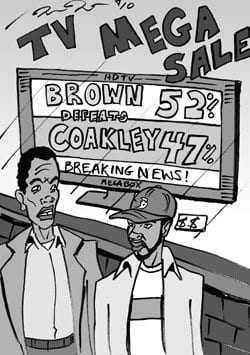
Tuesday’s debacle
| “You know they are going to try to blame Obama for this.” |
December was the most unaccommodating time for an election to replace Ted Kennedy in the U.S. Senate. The primary was on Dec. 8. Thereafter, the candidates had to compete with the Christmas and New Year holidays for the attention of the electorate.
Attorney General Martha Coakley easily won the Democratic primary with 47 percent of the vote in a four candidate field. Her closest opponent was Congressman Michael Capuano with 28 percent. State Sen. Scott Brown’s landslide Republican victory over Jack E. Robinson attracted little attention because Robinson was not considered by many to be an attractive candidate.
With her strong showing in the primary, political pundits were convinced that the Senate seat was Coakley’s to lose, and she went on to demonstrate just how she could accomplish the loss. There is little opposition to the assertion that she ran one of the weakest political campaigns in modern history.
Perhaps she and her campaign team were lulled into a false sense of inevitability because early polls showed her beating Brown 51-to-32 percent. Sometimes analysts take comfort in the polls when their candidate has a majority. The thinking is that if this result holds, the opponent will still be unable to make up the difference with the undecided voters.
The hardest part of campaigning, even more difficult than raising money, is retail politics. You have to go to where the people are, shake so many hands that the wrist becomes sore, and ask thousands of strangers for their votes. Candidates know that these forays among the electorate are the acid tests. Voters will decide after seeing you for only a moment whether they like you or not. Word spreads quickly if the candidate is unappealing.
Failure to succeed at retail means that there will be no crowds of volunteers willing to donate their free time on stand outs, telephone banks, efforts to place signs in their neighborhoods and work on the get-out the vote drive. And failure in retail politics also creates the impression of arrogance or at best, aloofness.
Brown did not win simply because Coakley was swept away by a tide of public anger. This anger has existed for some time and has resulted primarily from the failure of republican policies. When President George Bush took office, Bill Clinton left him a budget surplus of $128 billion. When Barack Obama succeeded Bush, he had to cope with a deficit of $357 billion, a tax rate that favored the rich and two wars to finance.
Voters are aware of the inequities. In 2007, income disparity in this country reached historical dimensions. According to an economic study the top 10 percent of wage earners received 49.7 percent of total wages. This is greater than any year since 1917 and even surpasses 1928, the year of the stock market crash.
The greed of Wall Street and big banks has caused the economy to tank. Certainly voters are aware that the middle class is now besieged. High unemployment and mortgage foreclosures are intensifying the problems of the middle class. A politician who is insensitive to the problem is unable to rebut the assertions of an opponent who represents the same party that created them. Perhaps Coakley, who does not know that Curt Shilling was formerly a star pitcher for the Red Sox, might live in a bubble protected from these human problems.
The black vote for Coakley was 94.9 percent in Roxbury and 99.4 percent in Dorchester, but turnout was low because there was no retail politics. This same pattern existed in other cities and towns with minority populations. The failure to mobilize this vote is a clear case of political malpractice that is damaging to the interests of minorities. And Democratic Party leaders now seem to be rationalizing Coakley’s unacceptable performance. The Party owes the people an explanation.
One must wonder now, about the grievances that caused a good public servant like State Treasurer Tim Cahill to resign from the Democratic Party.






